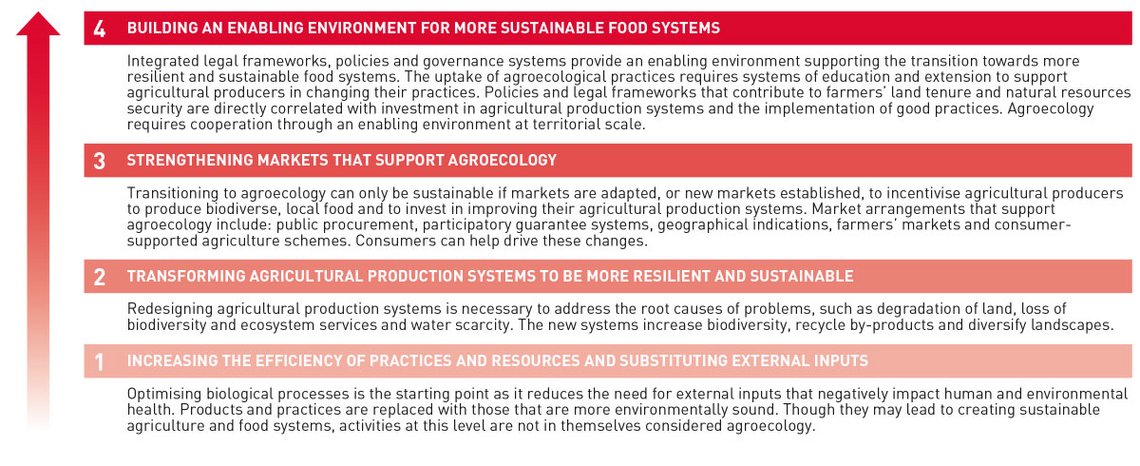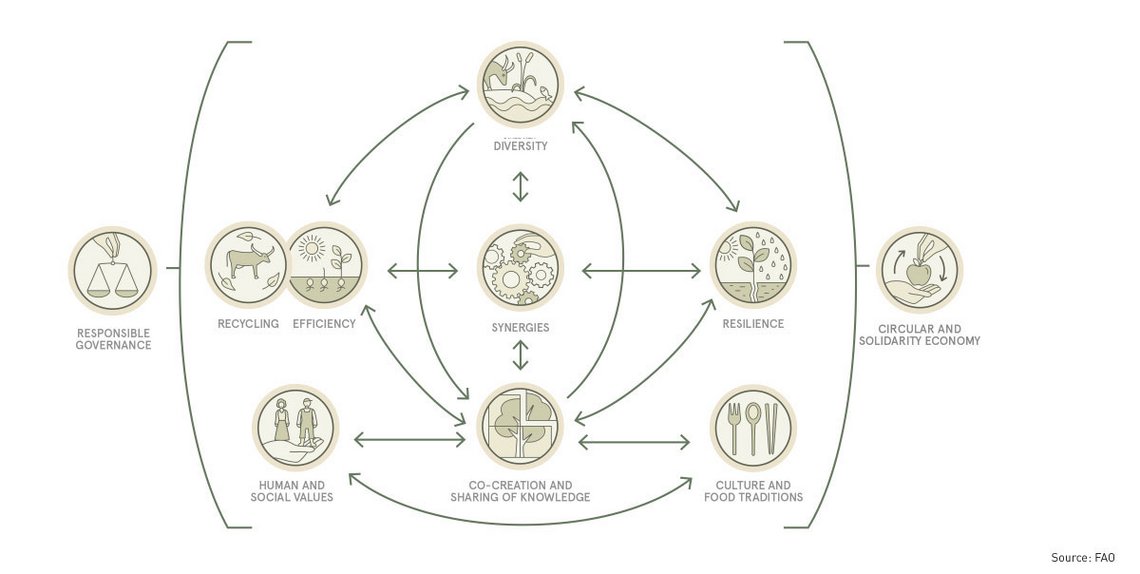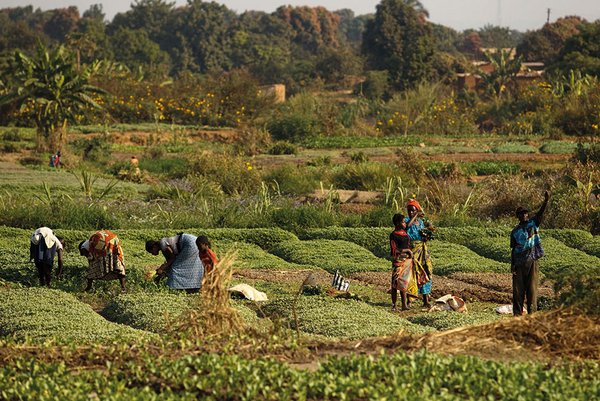 Download this article in magazine layout
Download this article in magazine layout
- Share this article
- Subscribe to our newsletter
Agroecology – a pathway to achieving the SDGs
Although not a new concept, agroecology is a key part of the global response to deforestation, water scarcities, biodiversity loss, soil depletion and greenhouse gas emissions and has the potential to alleviate poverty, reduce hunger and malnutrition and decrease inequalities. Agroecology contributes directly to multiple Sustainable Development Goals (SDGs): the eradication of poverty (Goal 1) and hunger (Goal 2); ensuring quality education (4); achieving gender equality (5); increasing water-use efficiency (6); promoting decent jobs (8); ensuring sustainable consumption and production (12); building climate resilience (13); securing sustainable use of marine resources (14); and halting the loss of biodiversity (15) while significantly increasing the resilience of both people and the environment, mitigating climate change, and sustainably using and conserving natural resources and biodiversity. Moreover, agroecology can contribute to achieving the aims of the Paris Climate Agreement, the Convention on Biological Diversity and the United Nations Convention to Combat Desertification.
Rooted in sustainability, agroecology is a people-centred and knowledge-intensive approach that matches the transformative approach called for by the 2030 Agenda. It has the potential to meeting the needs of future generations while ensuring that no one is left behind. Agroecology focuses on smallholder and family farmers, fisherfolk and pastoralists. It seeks to transform food and agriculture systems by addressing the root causes of problems and providing holistic and long-term solutions based on co-creation of knowledge, sharing and innovation, including the combination of local, traditional, indigenous and practical knowledge with multi-disciplinary science.
The future of agriculture is not input-intensive, but knowledge-intensive. We need the integrated approach that agroecology can offer.
FAO Director-General José Graziano da Silva, April 2018
Strengthening the global dialogue
With the organisation of the 1st International Symposium on Agroecology for Food Security and Nutrition in September 2014, the Food and Agriculture Organization of the United Nations (FAO) commenced strengthening the global dialogue and laying the groundwork for enhanced co-operation. This was followed by regional seminars held from 2015 to 2017 in five regions (sub-Saharan Africa, Latin America and the Caribbean, Asia and the Pacific, Europe and Central Asia, and the Near East and North Africa), involving 1,400 participants – representatives of governments, researchers, civil society, the private sector and the UN system – from 170 countries. Not only did these regional seminars reveal a diversity of perspectives, experiences and approaches, but they also identified commonalities between regions and across different approaches to agroecology – including shared challenges, opportunities and objectives, as well as common characteristics of agroecological systems, practices and approaches. In April 2018, a 2nd International Symposium titled “Scaling-up Agroecology to contribute to the SDGs” was held which brought together 700 participants, including representatives from 72 governments, 350 civil society organisations and representatives from six UN organisations. Participants analysed experiences, evidence and public policies to respond to the challenges faced by our agriculture and food systems (see Recommendations in Box) and confirmed the notion that it is time to upscale agroecology.
COMMON RECOMMENDATIONS ON AGROECOLOGICAL TRANSITIONS
1. Strengthening the central role of producers and their organisations in safeguarding, utilising and accessing natural resources.
2. Fostering experience and knowledge sharing, collaborative research and innovation.
3. Promoting markets for agroecology-based products and services.
4. Reviewing institutional policy, legal and financial frameworks to promote agroecological transition for sustainable food systems.
Where do we stand?
In preparation for the 2nd International Symposium, FAO’s work plan for 2018–2019 was analysed to present an overview of the organisation’s engagement in the field of agroecology and to expose gaps and opportunities for upscaling. The analysis revealed that eight per cent of FAO’s results planned for 2018–2019 support transitions to sustainable food and agriculture through agroecology. Two-thirds (64 %) of these results are to be delivered in 78 countries across all five geographic regions addressing food security, nutrition and health, access to markets for local production, family- and small-scale production, climate‑resilient approaches, sustainable natural resource management and sustainable food systems and livelihoods. In addition, 22 per cent of the work is being planned at regional level and 23 per cent at global level. Of the eight per cent of FAO’s results, almost 80 per cent of the activities contribute to building enabling environments for more sustainable food systems. Most of the planned work feeds into more than one of the four transition levels defined by FAO in 2018 (see Box), with a focus on level 1 in combination with level 4. Single-level interventions contribute only to level 4.
A ROADMAP TOWARDS AGROECOLOGY-BASED SUSTAINABLE FOOD AND AGRICULTURE SYSTEMS
Based on Stephen Gliessman’s five levels of food system change converting conventional agricultural production and food systems to agroecological food systems, the FAO defined four levels that can serve as a roadmap outlining a transformation process simultaneously achieving economic, environmental, social, nutritional, health and cultural objectives. Each level requires mechanisms in place to strengthen capacities, institutions, legal frameworks, policies and programmes that support transitional processes. The four levels describe a progressive path towards greater environmental, social and economic sustainability and can be implemented in any combination. The first two levels are at producer level. Levels 3 and 4 go beyond the producer level involving the broader food system and societal level. They require co-operation among producers within the same territory, which may require public support.
In addition, deriving from a comprehensive consultation process, ten elements were defined that may be used by national policy-makers and stakeholders in planning, managing and evaluating agroecological transitions (see Figure): diversity; synergies; efficiency; resilience; recycling; co-creation and sharing of knowledge (describing common characteristics of agroecological systems, foundational practices and innovation approaches); human and social values; culture and food traditions (context features) and responsible governance; circular and solidarity economy (enabling environment). These elements are interlinked and interdependent.
Opportunities exist for further incorporating and upscaling agroecology through better integration of the agricultural sectors (crop and livestock production, forestry, aquaculture and fisheries) and transition towards sustainable food systems approaches in collaboration with partners particularly at country and regional levels. In addition to the work already contributing to agroecology, a significant part of FAO’s work over 2018–2019 could be shaped to upscale the area.
The Scaling up Agroecology Initiative
In order to join forces and engage partners, the “Scaling up Agroecology Initiative” was launched together with UN agencies and other partner organisations during the 2nd International Symposium in April 2018.
In the transformative spirit of the 2030 Agenda, we will work with food producers, governments and other stakeholders to strengthen agroecology – as a promising approach –, harnessing a range of sustainable practices and policies, knowledge and alliances to achieve equitable and sustainable food systems in support of the SDGs.
Mission of the Scaling up Agroecology Initiative
The initiative is to focus on the following challenges, which were identified in the consultations:
- There is a lack of awareness of agroecology among policy-makers.
- Agroecological transitions require an enabling environment providing positive incentives and buffers for food producers while they transform their systems, which takes time to realise the full benefit.
- Political and economic support needs to prioritise sustainable approaches, including research priorities taking into consideration externalities of food systems.
- Research, education and extension systems do not sufficiently respond to the needs of agroecology as an approach to effectively transform food and agricultural systems (see also article "More inter- and transdisciplinary research is needed in agroecology").
- Current market systems are not responding to agroecological approaches and the needs of diversified agroecological production systems or the needs of consumers for diversified and healthy diets, particularly those of small-scale food producers and poor urban consumers. Successful models which re-connect producers and consumers, rural and urban areas (such as community-supported agriculture schemes, public procurement programmes, e-commerce and participatory guarantee schemes) need to be strengthened, and agroecological producers require improved access to these market opportunities.
- There is a lack of co-ordinated action and collaboration in policy and governance. Policies need to be integrated across scales (local, national and international) and sectors (from agriculture, fisheries and forestry to economic, social and environmental sectors) to achieve coherence through a territorial approach.
The way forward
The Scaling up Agroecology Initiative aims to accompany and support national agroecology transition processes through policy and technical capacity. To this end, it will build alliances among different stakeholders, strengthen networks and allow co-creation of knowledge and knowledge sharing. The Initiative is to focus its efforts on three areas of work: knowledge and innovation improving the evidence base on agroecology and ecosystem-based approaches; policy processes assisting countries in the development of policies for agroecology with the participation of non-state actors by harnessing existing international instruments and decisions of inter-governmental bodies, including the 2030 Agenda;
building connections for transformative change by working with governments, producers’ organisations, consumers, civil society, research and the private sector, supporting networks and platforms for knowledge exchange and dialogue for these stakeholders at national, regional and international levels.
We are convinced that co-operation among partners and a wide range of actors and institutions is necessary to scale up agroecology in order to achieve the SDGs and invite interested stakeholders to engage in the Scaling up Agroecology Initiative. As a first step, FAO will develop with partners a detailed ten-year action plan to operationalise the Initiative.
Beate Scherf is Programme Officer for FAO’s Strategic Programme 2 (Making agriculture, forestry and fisheries more productive and sustainable). She previously worked on issues related to sustainable livestock development and the management of animal genetic resources, particularly assisting countries in the implementation of the Global Plan of Action, and, with a team, Scherf developed the second global assessment on the state of animal genetic resources.
Contact: Beate.Scherf@fao.org; agroecology@fao.org
The views expressed in this article are those of the author and do not necessarily reflect the views of the Food and Agriculture Organization of the United Nations (FAO).
References and sources for further reading
FAO Publications on agroecology
Gliessman, S. (2016). Transforming food systems with agroecology, Agroecology and Sustainable Food Systems, 40:3, 187-189, DOI: 10.1080/21683565.2015.1130765





Add a comment
Comments :